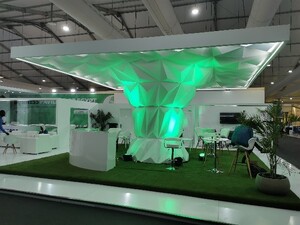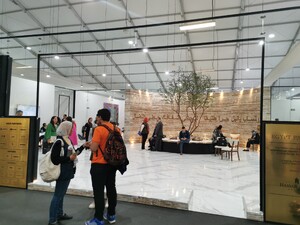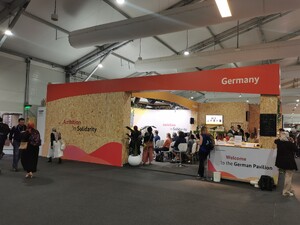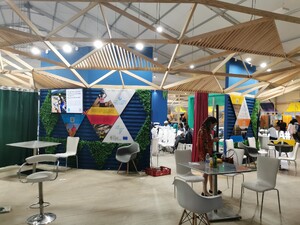
COP27 Tchibo at the Climate Summit
The climate summit in Sharm el Sheikh has just ended. The global result was frustrating. But on a small scale - and that's the good news - a lot is happening. Good things. For example, in the area of zero-emission shipping, because Tchibo is actively moving forward with many other players. Our colleague Sina Schoenlein (TLP), Project Manager Logistics & Sustainability, sat on the podium with fellow campaigners from Amazon at the presentation of the project - in a very chilly hall. Enclosed is the recording.

Sina reports here on how we will save a large part of our CO2 consumption with the coZEV initiative:
Sina, you were at the COP27 climate conference for Tchibo and our logistics division - and did you actually bring back good news?
I didn't see much of the big political scene on the ground, but at the level of the initiatives and industry discussions, I saw that many action plans had been forged. These now need to be implemented, including for us. Tchibo is part of the Cargo Owners for Zero Emission Vessels (coZEV) initiative. As part of this initiative, we have developed a roadmap that shows us shippers the prospect of buying only zero-emission ocean freight by 2040. I was able to present this in a panel at the conference (see above).
Of course, we are not the ones who build the ships or create the infrastructure, but as shippers we can send decisive signals. After all, shipping plays a crucial role in achieving our climate targets. And not just for us. Behind coZEV are 19 companies (such as Amazon, Beiersdorf, IKEA, Patagonia, Unilever) and together they are increasing demand for zero-emission ocean freight. This should lead to further investments in infrastructure and ships.
This initiative is very important for our Tchibo CO2 goals?! Maybe even a game changer?
Shipping accounts for about 10 percent of our Scope 3 (i.e. downstream) emissions. About 80 percent of scope 3 emissions come from coffee and cotton fields and factories. Since there are numerous fields and factories involved, each location has a comparatively small emissions footprint. So taking action here is difficult anyway. In shipping, on the other hand, we have far fewer players, each with high emissions. As soon as an emission-free service is offered, it is up to us to select it and thus actively reduce emissions. By bringing several companies together through coZEV, we can increase our voice and demand the investment it takes to establish zero-emission ocean freight.
What does our involvement with coZEV look like?
I am on several working groups and so have been part of shaping the roadmap. This means regular meetings with international companies. Basically, it is about sending a trustworthy signal to the industry to increase investments. The "Actions" of the Roadmap describe these signals.
For example, in the future there will be a "Policy Coalition" that interacts with policymakers to establish measures that reduce the existing price gap. With ZEMBA (Zero Emission Maritime Buyers Alliance) an initiative will be established to publish a demand for "zero emission" sea freight as a consortium. In addition, the Green Corridor Advisory Board will be established to help shippers keep track of Green Corridor projects and to provide input. A Green Corridor is a trade connection (e.g. Singapore - Rotterdam) that is to be mapped without emissions.
In a few years, the ships carrying our non-food goods from Asia, but also the coffee from South America, will sail the seas CO2-free?
It will still be a few years before we get there. The first few ships that could sail emission-free will hit the water next year. "Could" because the ships are equipped with 2 engines that can fuel both the heavy fuel oil used today and lower-emission fuel. To decarbonize all ocean freight by 2050, 5% of the fuel must be "zero emission" by 2030. That doesn't sound like much, but it is. Just remember that a ship is in service for up to 20 years. This means that ships built today will be in service until about 2042. A rolling replacement is not done in a few years. Accordingly, of course, our goods cannot travel only on these emission-free ships in a few years. The "green power principle" or mass balancing, which is also known from cotton procurement, applies here. We pay for the CO2-free fuel, reduce our emissions and thus promote global expansion.

Our CO2-free future is positive, at least in terms of shipping?
I think so. But it takes time and the right decisions and unions at the political and corporate level. It can only be done together, I noticed that throughout the conference. The word "Together" was really in every conversation. That's why it's so important that we join forces with many other companies. And there is a great spirit here among all the companies. Many are pulling on a rope and want to set sail!
What else did you take away from the climate conference?
The conference site was huge and consisted of several large tents. In total, there must have been 1000 booths set up, like at a trade fair. All the countries of the world and various initiatives and NGOs had their own specially designed booth. That was already very interesting to observe. Quite inappropriate for a climate conference was the air conditioning. This was set so cold that one constantly froze in the tents and I used a winter scarf as a blanket. However, I read that this was adjusted in the second week of the conference.
The presentations were totally diverse. The most extraordinary I found was a panel with 4 women, where among others the mayor from Bethlehem was present. She reported on a project that improved the water supply for the citizens and how she personally worked for it. A female doctor from Cairo reported on the sorting of plastic. Without the daily work on our garbage, the earth would already be in a very different state.





